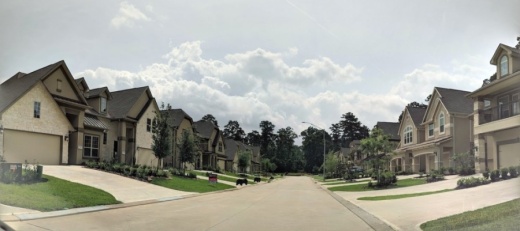In April compared to April 2019, new listings in Montgomery County were just under 4%, sales were running 1.4% higher and days on market were down by 3%, said Fullerton, who is also with RE/MAX of The Woodlands and Spring. Fullerton attributed low interest rate levels as a driver behind the pickup in demand.
Still, this April brought a slowdown in active listings and sales, she said.
“We were off to a roaring start in the HAR general area, and we were anticipating a really good year, but we’ve seen a downturn,” she said.
And as coronavirus restrictions forced many to hunker down, the real estate industry had to find ways to buy and sell homes virtually. Amidst the pandemic, the HAR said it would not advertise in-person open houses any longer, which created some unique challenges but also advantages, Fullerton said.
“I’ve been in the business for 42 years, and I’ve lived through the downturn the oil business in the '80s, some of the early floods in the '90s in the Montgomery area, the recession after 9/11 ... and [Hurricane Harvey], and I have never seen something like this pandemic,” she said.
The real estate industry has had to transition to virtual showings and open houses, promoting online DocuSign and trying to get transactions that were pending to close remotely, she said.
“It has completely restructured how we are doing business,” she said. “It has affected all parts of our daily life unlike we’ve ever seen before or maybe see again, and it will probably create a new normal, whatever that new normal is.”
For some, particularly older real estate agents who may not have grown up with iPhones and tablets, the transition was generally harder, Fullerton said. And even now as restrictions slowly ease, the best way to buy and sell houses in the “new normal” depends on individual preferences.
On the one hand, many clients may not feel comfortable purchasing property without physically taking a tour, Fullerton said. But on the other, many customers are not ready to drive to an open house not knowing if it was properly sanitized, even while wearing masks and gloves.
“Conversely, sellers weren’t completely comfortable with people coming into their houses not knowing if they were asymptomatic, so you had resistance on multiple fronts,” she said.
Still, between May 5-11, the HAR reported a 9.7% increase in the number of appointments for property showings in the Greater Houston area, including Montgomery County, which the entity credited to consumers taking advantage of easing restrictions.
But one aspect of the industry that could potentially benefit from an emphasis on going virtual is large events, Fullerton said. For instance, the National Association of Realtors held its legislated meeting in May virtually instead of in Washington, D.C., and the number of attendees was three times what the national average was—28,000 virtual attendees compared to 9,000 in-person attendees, she said.
Between May 5-11, the Greater Houston area had 241 virtual open houses that drew 1,330 attendees, according to the HAR.
Meanwhile, the industry could also see fewer real estate agents working in offices.
“The industry is going to change just like every industry probably will change,” Fullerton said. “Some of the businesses in The Woodlands may have more of their employees work from home.”





